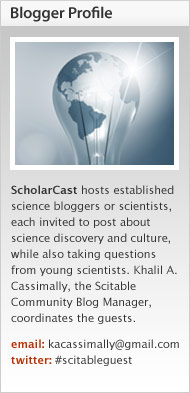« Prev Next »
To start off our brand new blog, we welcome Charles Q. Choi, a prolific science writer. Charles has contributed to Nature, The New York Times, Science, Wired and also blogs at Scientific American about his life as a professional science writer.
During the course of this week, Charles will conjure blog posts about his life as a freelancer. But right now, here's more from Charles:

My dad's a professional artist whose work's been auctioned at Christie's and Sotheby's. He often draws landscapes for a living, and he used to take me with him when he went out to take reference photos for his paintings. So I came to see nature as a work of art, one that I could see the underlying workings of. My mother's a computer programmer, so I think I got my technical rigor from her, and she made me read the dictionary as a kid, so I grew up with a love of words—read up to 30 books a week as a kid, and every biology book in my nearby public library by the 3rd grade. Science and writing were some of my earliest loves, and science writing's an endlessly fascinating way for me to marry them together.
Right now I'm interested in advancing my craft as a science writer. I'm trying experiments in science writing, and would like to write a book.
You travel a lot around the globe. How does this impact on what you write?
It's invigorating. The people I interview on a daily basis may be in Paraguay or Ethiopia or Japan or Siberia, so a lot of the interviews I conduct as a science writer are usually over the phone or email, since it wouldn't make any sense for me to expend the money and time meeting each source face-to-face for the up to dozen or so stories I may write a week. While I love the fact that modern telecommunications enables me to reach out to interview these researchers, it's not ideal journalism—you really want to use all your senses to depict what life might be like in the field, immerse yourself in what the researchers are doing, catch their nuances of gaze, facial and body language, notice details that might otherwise get lost. Travel is a key way for me to do the kind of journalism I prefer.
My number one rule in journalism is that it is meant to show readers things they could never see by themselves—the halls of power, war zones, intimate moments, a person's thoughts, and in the case of science journalism, the distant past, the far future, remote galaxies, the insides of atoms, and places that might have been but never were. Traveling around the globe helps me live up to my own standards.
What will you be writing about here on ScholarCast during the next few days?
Science writing is a very exciting career that scientists might pursue. I'll do my best to show you all how it's done.
If you have to describe your experiences with science (research, writing, etc) in one sentence, what would you say?
Science is an endless panoply of wonder, and science writing is like a never-ending seminar of the most fascinating latest discoveries in science.






















